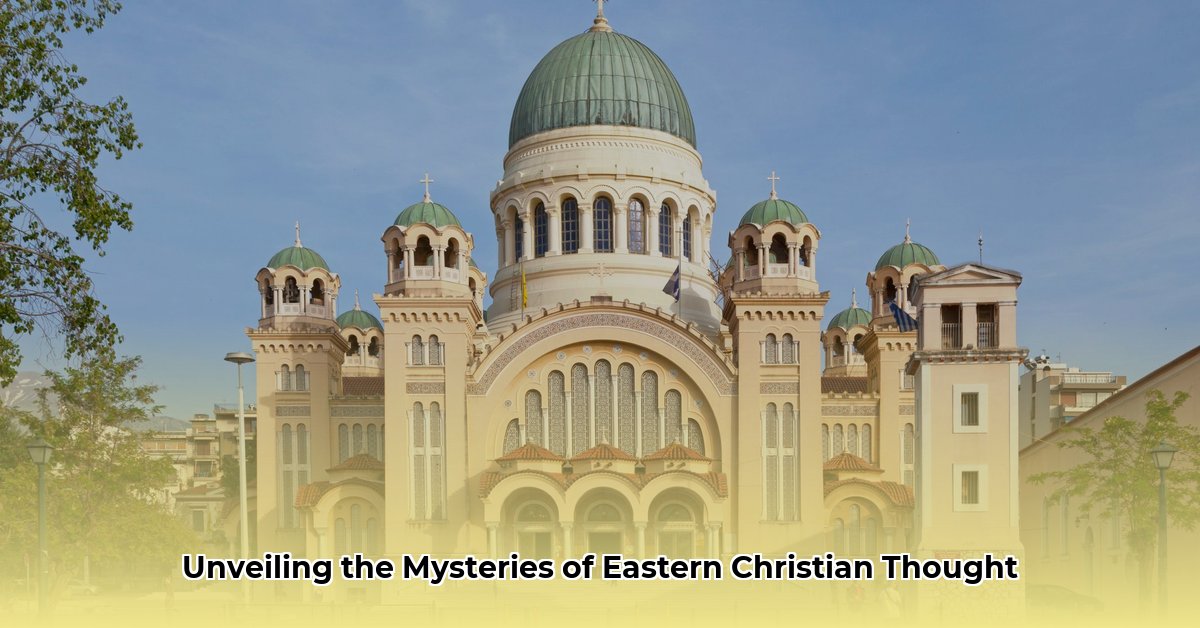Delving into the Heart of Eastern Orthodoxy
Orthodox Christianity is far more than its captivating aesthetics and ancient rituals. It’s underpinned by a rich philosophical system that informs every aspect of belief and practice. This article explores the core tenets of Orthodox thought, guiding you through key concepts and their practical implications.
The Trinity: One God in Three Persons
Central to Orthodox belief is the Holy Trinity: one God existing as three distinct persons – Father, Son (Jesus Christ), and Holy Spirit. This profound mystery, while seemingly paradoxical, forms the foundation of Orthodox understanding of God’s nature and relationship with creation. How can oneness and threeness coexist? This question has occupied theologians for centuries and continues to be a source of contemplation and wonder.
Christ’s Incarnation: The Bridge Between Heaven and Earth
The Incarnation, the belief that the infinite God became fully human in Jesus Christ, is a pivotal concept. It suggests a profound connection between the divine and human, bridging the gap between heaven and earth. This act of divine humility raises profound questions about the nature of both divinity and humanity. How could the creator of the universe choose to experience the limitations and vulnerabilities of human existence? Exploring this mystery offers a glimpse into the boundless love and compassion at the heart of the Christian message.
Theosis: Journeying Towards God-Likeness
Theosis, the concept of becoming more like God, lies at the heart of Orthodox spirituality. This transformative journey involves growing in holiness and drawing closer to God, not through becoming gods ourselves, but by reflecting God’s divine qualities. Think of a mirror reflecting the sun’s light – the mirror doesn’t become the sun, but it carries its radiance. Similarly, theosis is about reflecting the divine light in our own lives.
Apophatic Theology: Knowing God Through Negation
Recognizing the limitations of human comprehension, Orthodox theology employs apophatic theology – a way of approaching God by describing what He is not. This approach acknowledges the inherent mystery surrounding the Divine, suggesting that true understanding comes not through definitive pronouncements but through humble acceptance of the limits of human knowledge.
The Importance of Sacred Tradition: A Living Legacy
In Orthodoxy, Sacred Tradition isn’t merely a set of rules; it’s a living stream of wisdom passed down through generations. It complements Scripture, offering guidance for understanding its teachings and navigating the complexities of life. Some scholars argue that Tradition provides a crucial link to the early Church, ensuring continuity and authenticity of belief.
East and West: Divergent Paths in Christian Thought
While sharing common roots, Eastern Orthodoxy and Western Christianity (Catholicism and Protestantism) diverge on key theological points. These differences, often subtle, have significant implications for understanding God, salvation, and the Church.
| Feature | Eastern Orthodoxy | Western Christianity |
|---|---|---|
| Filioque | Holy Spirit proceeds from the Father | Holy Spirit proceeds from the Father and the Son |
| Papal Authority | No single earthly head of the Church | Pope as head of the Catholic Church |
| Salvation | Synergistic: cooperation between God’s grace and human effort | Varied perspectives, often emphasizing grace alone |
| Source of Authority | Scripture, Tradition, and Ecumenical Councils | Primarily Scripture, especially in Protestantism |
Pillars of Orthodox Thought: Shaping the Tradition
Numerous influential figures have shaped Orthodox thought throughout history. From the Cappadocian Fathers (Basil the Great, Gregory of Nazianzus, and Gregory of Nyssa), who clarified the doctrine of the Trinity, to St. Maximus the Confessor and St. Gregory Palamas, who explored the mysteries of Christology and theosis, these thinkers continue to inspire and challenge believers today.
Ancient Wisdom for Modern Living
Orthodox religious philosophy offers profound wisdom for navigating contemporary challenges. It addresses fundamental human longings for meaning, purpose, and connection to something greater than ourselves. Some suggest that its emphasis on inner transformation and spiritual practice provides a powerful antidote to the anxieties of modern life. However, the relevance of ancient traditions in a rapidly changing world remains a subject of ongoing discussion and debate.
Theosis: The Heart of Orthodox Spirituality
Theosis, often translated as “divinization,” is a cornerstone of Orthodox Christianity. It’s about becoming more like God, reflecting His divine qualities, and experiencing a deeper connection with the Divine. It’s a transformative journey, not a destination, and it requires ongoing effort and cooperation with God’s grace.
Theosis is not about becoming God in essence, but about participating in God’s divine energies. It’s a process of growth and transformation, of opening ourselves to God’s presence and allowing His grace to work within us. This transformative process is rooted in the belief that humans are created in God’s image and likeness, carrying within them the potential for divine likeness. However, various interpretations of theosis exist within Orthodox theology, prompting ongoing discussions about its precise nature and implications.
Prayer, participation in the sacraments, and ascetic practices like fasting and self-reflection are all integral to the journey of theosis. They aren’t mere rituals but spiritual disciplines that cultivate inner transformation and foster a deeper connection with God. These practices are seen as pathways to experiencing God’s energies, allowing us to participate more fully in the divine life.
Theosis is a distinctive feature of Orthodox Christianity, setting it apart from other Christian traditions that primarily emphasize forgiveness of sins. While forgiveness is essential, Orthodoxy views salvation as a holistic transformation, a process of becoming more Christ-like through God’s grace and our active participation. This emphasis on transformation has resonated with many throughout history and continues to draw seekers today.
Essence and Energies: Understanding God’s Interaction with Creation
The concepts of God’s essence and energies offer a framework for understanding how a transcendent, incomprehensible God can interact with the created world. God’s essence remains utterly unknowable, beyond human grasp. However, God’s energies are the means by which God acts in the world and interacts with creation, allowing us to experience the divine.
These energies are not created by God; they are uncreated and eternally proceed from God’s essence. They are, in a sense, God himself, actively present and at work in the world. This distinction between essence and energies allows for a God who is both wholly other and intimately involved in creation. However, the precise nature of this distinction and its implications remain a subject of ongoing theological reflection.
Experiences of God’s energies can range from dramatic events like Moses encountering the burning bush to more subtle encounters through prayer, acts of kindness, or moments of profound beauty. These encounters offer glimpses of the divine, reminding us of God’s presence in our lives and throughout creation. Some scholars argue that these experiences are subjective and open to interpretation, while others maintain their objective reality as manifestations of the divine.
The 14th-century Hesychast controversy, a debate surrounding the mystical practices of Orthodox monks, played a crucial role in clarifying the distinction between essence and energies. St. Gregory Palamas’ defense of the Hesychasts established the understanding of uncreated energies as the means by which humans can experience the divine without comprehending God’s inaccessible essence. This distinction remains a cornerstone of Orthodox theology, although its interpretation continues to be debated and refined.
The concepts of essence and energies have profound implications for how Orthodox Christians understand their relationship with God and the world. They suggest that everything in creation carries a spark of the divine, inviting us to seek and experience God’s presence in all things.
Christ’s Incarnation: The Hypostatic Union
The Incarnation, the belief that God became truly human in Jesus Christ, is central to Christian theology. The Orthodox Church articulates this mystery through the doctrine of the Hypostatic Union, which affirms that Jesus Christ is fully God and fully human, united in one person without confusion or separation. This complete union is crucial for Christ’s role as mediator and savior.
The Incarnation is rooted in Scripture, with passages like John 1:14 (“The Word became flesh and made his dwelling among us”) pointing to God taking on human form. However, interpretations of these passages have varied throughout history, leading to theological debates and the development of different Christological doctrines.
The early Church grappled with understanding the nature of Christ, leading to the convening of Ecumenical Councils. Councils like Nicaea, Ephesus, and Chalcedon were instrumental in defining the Orthodox understanding of the Incarnation, rejecting heretical views and affirming the full divinity and full humanity of Jesus Christ.
The Virgin Mary, known as Theotokos (“God-bearer”), plays a vital role in the Incarnation. Her miraculous conception of Jesus by the Holy Spirit affirms both his full humanity and divine origin. Mary’s willing participation in God’s plan highlights the importance of human cooperation with divine grace.
The Incarnation is understood as an act of divine love, motivated by God’s desire to restore humanity’s relationship with Him. It opens the path to theosis, allowing humans to participate in God’s divine life and become more Christ-like through grace. However, the implications of the Incarnation for contemporary ethical and social issues continue to be explored and debated within Orthodox thought.
Sacred Tradition and Experience: Foundations of Orthodox Faith
Orthodox Christianity emphasizes the interplay of Scripture and Sacred Tradition. Scripture, the inspired word of God, forms the foundation, while Sacred Tradition, the living transmission of the faith, provides context, interpretation, and ongoing guidance. This includes the teachings of the Church Fathers, the decrees of Ecumenical Councils, and the lives of the saints. While some debate the relative authority of Scripture and Tradition, Orthodoxy views them as complementary and inseparable.
Personal experience plays a vital role in Orthodox spirituality. Through prayer, participation in the sacraments, and ascetic practices, individuals seek to encounter God’s energies and experience theosis. These practices are not mere rituals but pathways to a deeper connection with the divine. While some might question the subjectivity of religious experience, Orthodoxy emphasizes its transformative power and its potential to reveal spiritual truths.
Orthodox theology engages with philosophical thought, drawing particularly on ancient Greek philosophy, especially Plato and Aristotle. These philosophical insights provide a framework for understanding concepts like theosis and the distinction between essence and energies. However, the integration of philosophy and theology has also been a source of debate, with some arguing for a greater emphasis on scriptural revelation.
Orthodox thought is not static but dynamic, adapting to contemporary challenges while remaining rooted in tradition. The Church engages with social and ethical issues, seeking to apply its timeless teachings to the complexities of modern life. This ongoing engagement raises questions about how tradition can be both preserved and reinterpreted in a changing world. Further research explores how Orthodox thought can contribute to addressing contemporary challenges, promoting dialogue, and fostering a deeper understanding of the human condition.
- How to Produce Electricity at Home for Energy Independence - January 29, 2026
- How To Create Electricity At Home For Energy Independence - January 28, 2026
- How to Make Electricity at Home Using Renewable Energy Sources - January 27, 2026
















